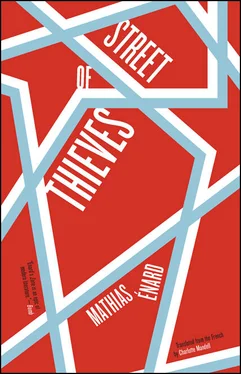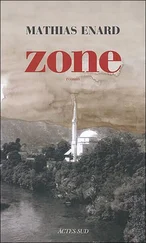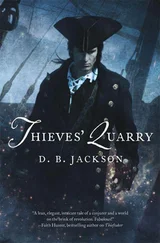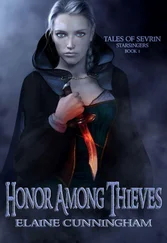For a bit I thought she might take a bus and come see me, after all she could enter the customs zone without any problem. I dreamed of being the last crew member on the Ibn Battuta —we’d have the whole boat to ourselves, I’d have gotten hold of the nicest cabin and we’d have spent a dream vacation together, a magnificent motionless cruise, looking at the containers waltzing on the cranes and the to and fro of the transporters.
But there were still a good thirty or so crewmembers between me and my dreams. I couldn’t quite see myself telling the Captain or Saadi “I need a double cabin, I invited my girlfriend to spend a few days with us,” as if our ferry were a country house. We received a few visits — journalists or dockworkers, mainly — but no one stayed overnight, of course.
The time passed very slowly. In the morning I would walk around a little on the port, in the Zone; I would greet the Spaniards working there, often they’d offer me a coffee and we’d chat for a few minutes; they would ask me, So, what’s new, and I’d invariably reply, Nothing new for now. They told me it was funny, qué locuna, they could at least give you a visa to go look around town. I would always reply, oh yes, no estaría mal, hoping but not believing that one of them would one day take the initiative of going to negotiate with the cops from the Policía nacional. They should send you oranges from your place, they’re in season, one of them said, who had just unloaded a bulk carrier of citrus fruit, and he laughed, and was immediately scolded by another, showing more solidarity, who said it must not be much fun, still, put yourself in their place, if we were stuck in the port of Tangier, it definitely wouldn’t be very funny.
After the coffee I would continue my tour of the docks, mentally take note of the movements of the ships, there were boats for everything, different shapes according to what they contained; poultry boats that transported thousands of clucking chickens in cages; vessels loaded with bananas and pineapples that smelled so strong you felt as if you were plunging your head into some fruit juice; refrigerated ones overflowing with frozen products in special containers; immense barges laden with train tracks, sand, or cement; grain boats like floating silos and modern container ships, real multicolored vessels with ten floors. Some of them came from very far away via the Suez or the Atlantic, others from Marseille, Le Havre, or northern Europe; they rarely stayed docked more than a few hours. A few were new or freshly repainted, others were carting, along with their cargo, tons of rust, and you wondered by what miracle they didn’t break apart at the first wave.
Then I would return to the Ibn Battuta, there was always a chore to do, cleaning, swabbing the deck, laundry, peeling potatoes; we weren’t repainting the hull yet, as the captain said, but we were so bored out of our minds that if some good soul had given us some paint, I think we would have set about it. I was discovering life on board ship — docked, that is.
The bane of sea life is the cockroaches. They are the real owners of the boat. They’re everywhere, by the thousands, on all floors; they come out at night, so much that you’d better not wake up at three in the morning and turn on the light: you’ll always find three or four, one or two on your blanket, one on the wall and one calmly settled on your neighbor’s forehead, on the cot opposite, and you imagine that they act the same with you when you’re sleeping, that they gently stroll about on your closed eyelids, which terrified me at first, made me tremble with horror — after a while you get used to it. The roaches come from the lower decks, from the heat of the engine rooms; that’s where their numbers are highest, and the engine workers live with them. I don’t know what they could feed on, I suppose they treat themselves to our supplies and eat from our plates. All attempts to exterminate them were seemingly doomed to fail: as soon as a boat is contaminated with cockroaches, that’s it, nothing can be done. No matter how hard the deck and gangways are scrubbed with bleach and no matter how many traps are set in our cabins, they still appear. Saadi told me you could tame them, a little like birds. He confessed that before, at night, on his freighter, during the long hours of his watch, he would talk to them.
Saadi had adopted me, so to speak: we shared a cabin, and in the long boredom of evenings on board, his company was magical. He worked in the engine room; he was the one who pampered the ship’s two Crossley motors. Listening to him was like skimming through an endless book you never got tired of, since its contents were vast and slightly different every time. He told me about the Southern seas, the Leeward Islands, which are, God forgive me, he said, the earthly version of Paradise — men who have seen them always keep that wound in their heart and find no rest until they can return to them. He also knew the big seaports of China, Hong Kong, Macao, Manila. Singapore is the cleanest city in the world; Bangkok the noisiest, and the most disturbing. He told me about the interminable line of brothels and strip clubs in Patpong, where Americans flock by the hundreds; a lot of them make the trip just for that, you’d think there weren’t any whores in the United States.
He had seen the cat-shaped Celebes, Java and Borneo, long Malaysia and the strait of Malacca, where there are so many ships they have to line up like cars in a traffic jam.
He spoke to me of the cows of Bombay — anyone can milk them in the street, directly into his cup of tea — and about the port of Karachi, the most dangerous on the planet, he said, you wouldn’t last a day there. It’s the realm of contraband, drugs, weapons. Custom inspectors don’t exist over there, he said. Everything is paid for in bottles of whiskey. The whores of Karachi are so badly treated they all have scars, bruises, cigarette burns.
Saadi had been through the Suez Canal I don’t know how many times, crossed the equator to go to Brazil, Argentina, South Africa. He had seen such violent storms that an immense freighter could dance like a fishing boat and where everyone was sick, everyone, even the pilot who steered with a bucket within mouth’s reach so he could puke without letting go of the controls; he had seen sailors die at sea, fall into the water and disappear in the turbulent immensity or else drop dead of fever or of sudden sadness, without enough time to reach terra firma to take care of them: then they’d throw the body into the waves, or the corpse would be folded up and piled into a freezer, according to the captain’s wishes; he had seen drunk sailors who could only sail with bottle in hand, sailors in knife fights over a girl or a wrong word, and even pirates, in the Gulf of Aden, boarding his ship and then abandoning it after a pitched battle with a military frigate, when the entire crew was locked up in the bottom of the hold. But strangely, the places he talked about with the most emotion were Anvers, Rotterdam and Hamburg, he loved the ports of the North, immense, bustling, serious, which adjoined big cities that had all the modern comforts — subways, luxury brothels, display windows, supermarkets, all kinds of bars, where the beer was cheap and where you could walk around without the fear of taking a knife in to the back like in Karachi.
Imagine dozens of kilometers of docks, he said, harbors over ten fathoms deep where the biggest boats in the world can moor — boats of the high seas, which normally never see any port: with our containers, we looked like small craft, pleasure boats next to those colossi when we passed each other in the channels. And the cities, ah my son, unfortunately we never stayed very long, but you’ve never seen so many skyscrapers, buildings of all kinds, in all colors like in Rotterdam, for instance. You’ve never seen so many immigrants, of all possible nationalities. As a matter of fact, I don’t think I saw more than one or two Dutchmen. There was a brothel full of just Thai girls, for instance. I even learned recently that the mayor of Rotterdam is Moroccan. That tells you how they respect foreigners, up there. A little like in the Gulf, I said. That made him crack up. You idiot, Rotterdam and Doha, they’re not the least alike, fool! And Hamburg! In Hamburg there are supermarkets for choosing whores and lakes in the middle of the city. In Anvers, in the center, you feel like you’re in the Middle Ages. But not a filthy Middle Ages like the Medina in Marrakesh or Tangier, no, an elegant, well-ordered Middle Ages, with magnificent squares and buildings that take your breath away.
Читать дальше












